“‘That’s two hours I’ll never get back,’ is a favourite thing for an angry person to say about a movie he hates. But the thing is, every two hours are two hours he’ll never get back.” It’s an interesting point, posited by screenwriter Charlie Kaufman. This demonstrates how we think of moviegoing as a transactional experience. When we buy a ticket, we expect a certain level enjoyment, or else. Or else what, exactly? Or else we’ll take to the figurative streets of Rotten Tomatoes and offer the world what it so desperately needs: another objective opinion on a subjective body of work.
The Tomatometer
The website, RottenTomatoes.com, is a great resource. The layout is much more consumer friendly than it’s counterpart, IMDb, and it has a nifty little “Tomatometer” that rates a film based on the average of critical reviews. Mind you, these are critical reviews from a gauntlet of sources, both partisan and nonpartisan. The issue with this barometer is not in its design, but in the misinterpretation of results by audience members.
For instance, a movie with a 90% Tomatometer score might have an average score of 6.7 out of ten. Meaning, that 90% is, in reality, closer to a 67%. A “D+” and an “A-” are too wildly different grades — which is also why my high school report cards would mysteriously “get lost in the mail”. When an average RT user sees a 90%, they see a gem. They see an opportunity to go see a movie that they assume is phenomenal. But, that’s not the fun part. The fun part comes after the credits roll, the lights come on, and the seats all fold back into their upright position. The fun part is logging onto RottenTomatoes and berating the critics for “tricking” you, the omniscient center of the universe, into seeing a bad movie.

Nothing Comes at Night!
For example, the latest victim of vitriol, Trey Edward Schultzs’s nightmarish thriller, It Comes at Night. For some perspective, this movie currently holds an 86% on RottenTomatoes with an average critic score of 7.4. All in all, a solid rating. Unless, you take a gander at the audience score of 44%. Yes, a 44. Just look at all the hate this thing has been getting as of late:


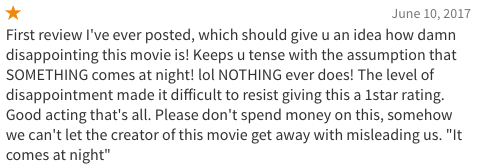
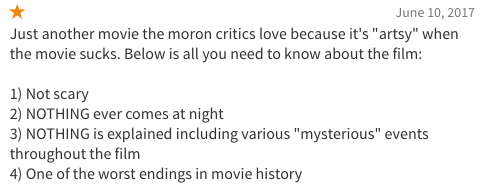

Notice anything interesting about these, well thought out criticisms? It seems to me that people expected something to come at night. I’m not sure what though, as the titular “it” remains veiled in ambiguity as if *gasp* by some element of purposeful design. I’m not saying that these people are dumb because they didn’t get the film. I understand that. What I don’t understand is firing off a whooping 1 star review because your expectations based on a title didn’t come to fruition. It’s this kind of review that demolishes any bit of integrity within the audience score system. It’s like how Blue Mountain State has a 4.8 on Netflix, whilst a World War 2 documentary has a 3.3. Just don’t.
I would also love to be in the same theater as the guy who meticulously polled EVERYONE in the audience just to reach the conclusion that, yes, they all share his view.
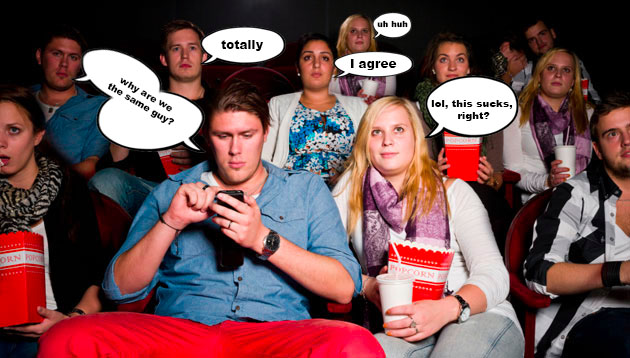
Blame the Critics, Not Me
On the flipside, 2017’s musclebound rendition of Baywatch found itself in the good fortune of this system. One of this year’s truly awful movies, Baywatch garnered a critical reception of 20%, while it’s audience members see it more like a 64%. It’s campy, nostalgia driven story was sure to attract its fair share of cult fandom, but some of these reviews are a little too much when juxtaposed with the former Schults project.

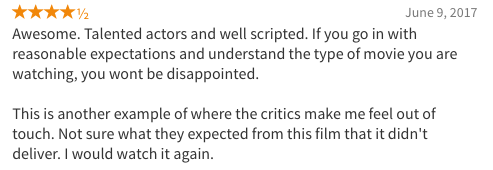
Didn’t know they had movie theaters in Mesopotamia.
While I’m all for a brazen sense of optimism, well scripted is a little generous to the team of writers that also spawned these masterpieces:
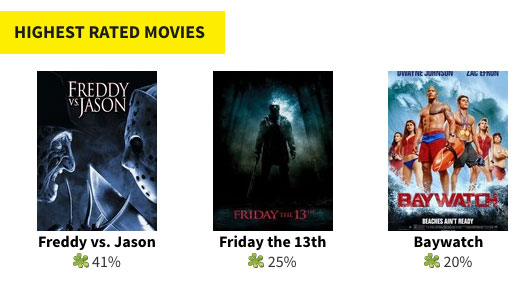
If The Tomatometer is Broke, Fix It
This is more than my personal vendetta against the audience score, I promise. It’s about expectations as a viewer and increased accessibility allowing disgruntled moviegoers to defame movies based on wholly subject expectations. To give something a zero, and spit in the face of critics is silly. It’s like calling Bobby Flay an idiot because he doesn’t think Panda Express is as dope as you do. Objectively speaking, Panda Express is probably a 2.8. But Yelp reviews will bill it closer to the high 3.0 mark because it’s centered around reasonable expectations. There is no expectational benefit-of-the-doubt on RottenTomatoes. None. Some singular reviews may take it into consideration, but those always get lost in a flood of one sentence reviews.
It’s tough to offer a bonafide solution without stepping on the toes of free speech in the process. Everyone is entitled to their opinion, after all. The least painful way to usher in a new regime of well-constructed audience reviews is to make a minimum character threshold. Brevity is still the ally of a fine review, but those one sentence reviews are no longer welcome. Implementing a Karma system similar to Reddit’s may be something to look into as well, if only to curb troll reviews. In truth, there’s a slew of things RottenTomatoes could do. But what about us?
Be The Solution You Want To See
We, the people, have the easiest solution available. We just have to understand the system. And, in reality, the system is pretty darn simple. So much so that RottenTomatoes lays out their algorithm for those stoic enough to click one measly button next a film’s respective score. The problem is not RottenTomatoes, it’s letting laziness trump thoughtfulness. As more and more people turn their backs on critics and publications, scoffing at their pretentiousness and “high-brow” opinions, the less viable the Tomatometer becomes. If the public at large then relies on the audience score, movies like Baywatch become industry standard. Sit through 90 minutes of Josh Gad being mercilessly unfunny while the Rock runs around launching F-bombs as if he just learned the word. Then tell me we don’t have a problem.

One Response
Many believe that the development of technology towards the selection process would completely rule out any human error.
Dust is sucked to the casing with the coolers and quickly gathers on the internal circuits.
In this article I am going to discuss various popular features
of an extra cell phone and I will require the Gresso sol model as a possible
example.